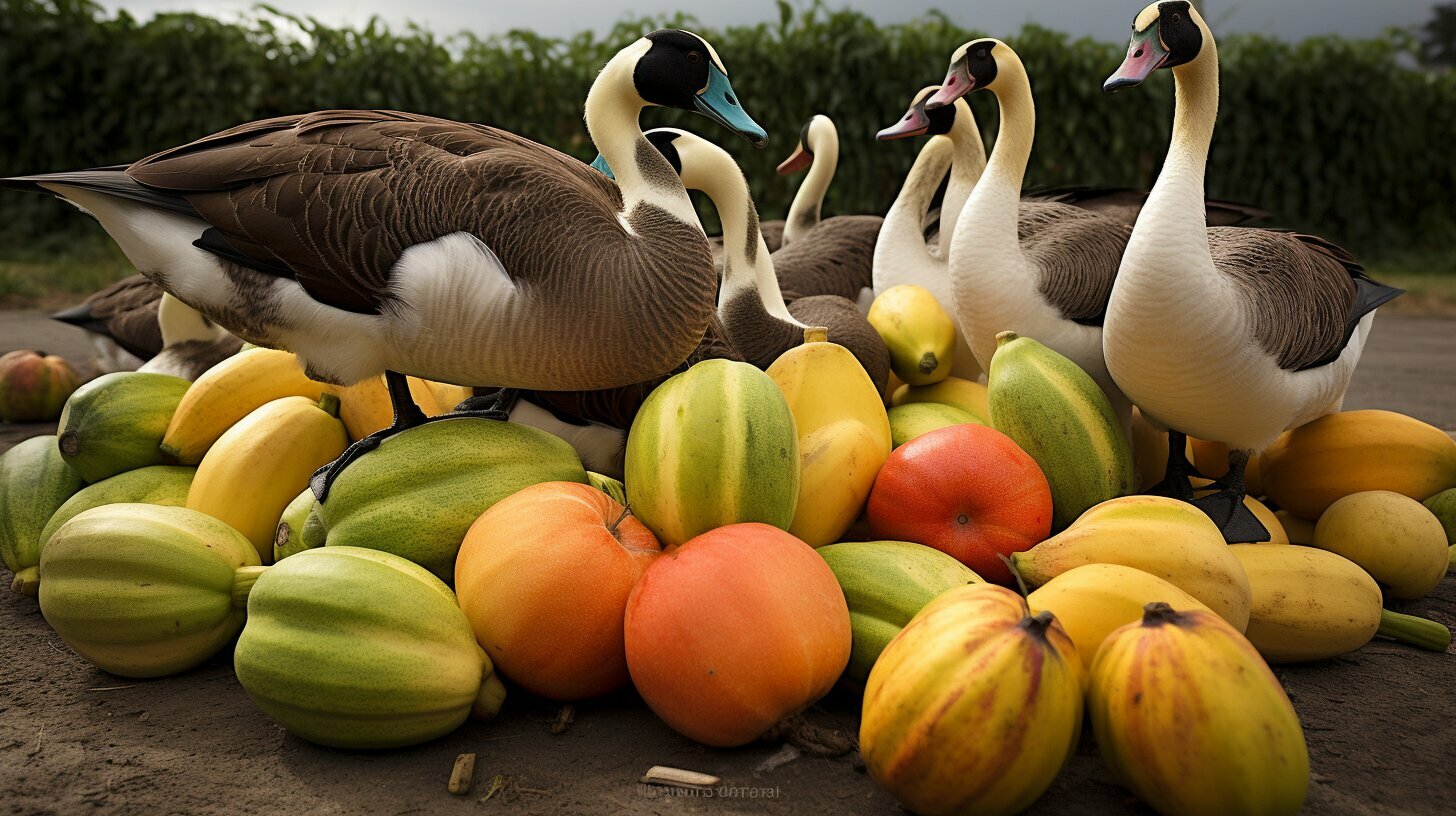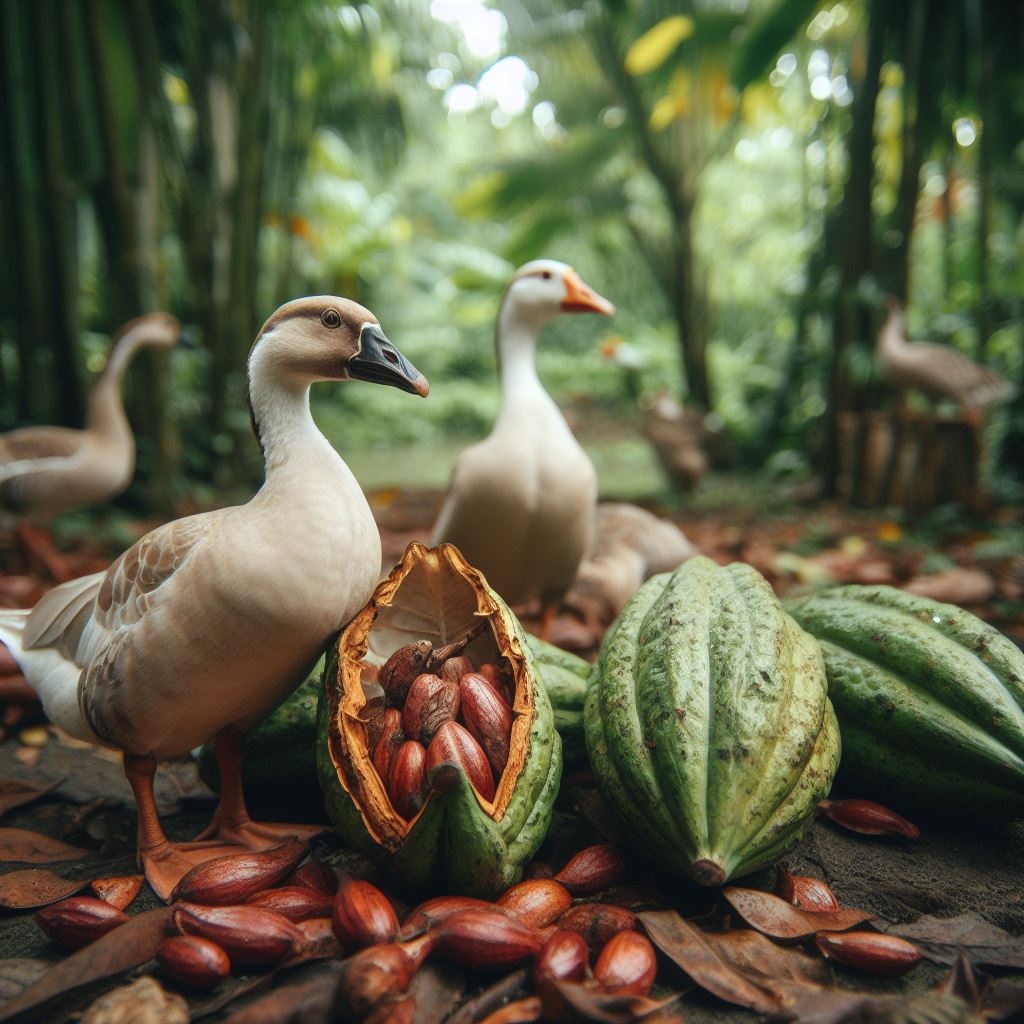Can Canadian Geese Eat Bananas? Unusual Snack

Table of content:
- Canadian Geese Have Adapted to Eat Plant Foods
- Bananas Offer Carbs, Vitamins, and Minerals
- Feed Bananas in Moderation to Avoid Digestive Issues
- Be Mindful of Choking Risks when Feeding Geese Bananas
- Don’t Feed Geese Excess Human Foods like Bananas
- Feeding Bananas to Geese Safely is Possible
- Bananas Are OK for Geese in Moderation
Seeing these big birds up close naturally raises questions about what they eat. Can Canadian geese eat bananas? Are bananas good for geese? What are the potential benefits and risks of feeding bananas to geese? Let’s take a deeper look at how bananas fit into the diet of Canadian geese.
Canadian Geese Have Adapted to Eat Plant Foods
Canadian geese are primarily herbivores, which means they mostly eat plant foods. Throughout their native habitats, they graze extensively on grasses, aquatic plants, and other vegetation.
Their long necks help them reach down to aquatic plants from the water’s surface. On land, they use their strong beaks to nibble on grass shoots and tear vegetation. They swallow bits of plant material whole.
Canadian geese also forage in fields for seeds, grains, berries, and some insects to supplement their vegetarian diet. But grasses and greens make up the bulk of their nutrition.
Their digestive systems have adapted over time to make use of high-fiber plant foods. They swallow gravel to help grind up and digest coarse vegetation in their gizzards.
During migrations, Canadian geese seek outcrops like corn, wheat, rice, and soybeans to fuel their long journeys. These high-carb foods provide abundant energy for flying and active foraging.
So when it comes to fruits like bananas, how do they fit into the dietary needs of Canadian geese?
Bananas Offer Carbs, Vitamins, and Minerals
Bananas contain a good amount of carbohydrates and important vitamins and minerals that can provide energy and nutrition for geese.
Here are some of the main nutrients found in bananas:
- Carbohydrates – Bananas are about 72% carbs by weight, mostly in the form of sugars like sucrose, glucose, and fructose. These carbs can supply quick energy.
- Fiber – Bananas contain about 3 grams of fiber per medium fruit. Fiber aids goose digestion. But it’s low compared to grasses.
- Potassium – Bananas are rich in potassium, which supports fluid balance and muscle contractions.
- Magnesium – Magnesium in bananas helps with bone development, fluid balance, and enzyme functions.
- Vitamin B6 – Bananas contain vitamin B6, which geese need for metabolic processes and immune function.
- Vitamin C – Geese can utilize vitamin C in bananas as an antioxidant and for collagen formation.
- Protein – Bananas offer a small but usable amount of protein – about 1 gram per fruit.
So bananas can provide supplemental nutrition in the form of natural sugars for energy, electrolytes like potassium and magnesium, and vitamins that support the health of geese.
The high sugar content of bananas does mean there are some risks to consider when feeding geese this fruit.
Feed Bananas in Moderation to Avoid Digestive Issues
Bananas are relatively high in natural sugars compared to the greens and vegetation that make up the bulk of a goose’s diet.
Eating too many bananas could lead to an imbalance in gut bacteria and potential diarrhea or digestive upset in geese not accustomed to such sugary fruit.
The lack of fiber in bananas compared to grasses is another reason geese shouldn’t rely on bananas as a dietary staple. Fiber is what facilitates healthy digestion and gives geese a feeling of fullness from lower calorie plant foods.
But offering a few banana pieces along with their regular diet can give geese an extra boost of energy and nutrients during key times of year.
Spring migration – Bananas can provide supplemental nutrition for long migrations.
Nesting season – The extra calories from bananas may help female geese incubate eggs.
Molting season – Bananas can help offset the reduced foraging during feather molting periods.
Winter cold – Bananas offer easily digested energy to help geese cope with frigid temperatures.
The optimal amount of banana to offer depends on the size of the goose. A good guideline is:
- Large goose – 1/4 to 1/2 small banana
- Medium goose – 1/8 to 1/4 banana
- Small goose – 1 to 2 bites of banana
Checking that geese fully swallow banana chunks will help prevent digestive irritation and waste. Providing organic bananas when possible reduces pesticide risks.
Overall, bananas fed occasionally in modest amounts can give geese an extra boost without overloading their digestive system.
Be Mindful of Choking Risks when Feeding Geese Bananas
One of the biggest dangers of geese eating bananas is potential choking from trying to swallow pieces that are too large or not chewed enough.
Geese do not have chewing teeth. They use their strong beaks and tongues to break off and soften pieces of food.
But if offered a large chunk of banana, a goose may try to swallow it whole. Bananas can get easily lodged in their throats due to their dense, pulpy texture.
Baby goslings under 3 months old are at particular risk of choking on banana pieces since their throats and digestive abilities are still developing.
To reduce the risks of geese choking on bananas:
- Peel bananas before feeding to geese. The skin poses a choking hazard.
- Chop bananas into small, beak-sized pieces. Quarters or eighths are safer than halves.
- Make sure geese fully swallow each piece before offering more.
- Monitor geese while they are eating any new food, including bananas.
- Only feed young goslings nibbles of very soft mashed banana.
Using care when preparing and providing bananas to geese helps minimize potential safety issues. Their long necks make it hard for geese to cough up or dislodge obstructions. A goose that starts coughing and gagging after eating a banana may require help. Preventing issues is best.
Don’t Feed Geese Excess Human Foods like Bananas
Beyond nutritional and choking concerns, another risk of feeding geese bananas or other human foods is creating dependence.
Geese can start relying on easy handouts and lose their natural wariness of humans. They may become aggressive and pester people for food rather than foraging naturally.
Flocks accustomed to being fed by people can damage gardens, golf courses, and other landscaping in search of more treats. Their droppings can become a nuisance.
While bananas themselves are not toxic or immediately dangerous to geese, inappropriate feeding encourages problematic behavior.
Waterfowl experts advise not feeding geese excess treats, including:
- Bread – Offers little nutrition and can cause deformities.
- Crackers – High salt content can harm geese.
- Chips – Grease and additives create digestive issues.
- Popcorn – Unpopped kernels pose choking risks.
- Candy – Causes malnutrition and other illnesses.
It’s better to let geese act naturally and find their food sources. If enjoying watching geese, just observe them without artificial feeding. Supporting proper habitat for foraging maintains healthier flocks.
But if geese happen to come across a discarded banana peel while grazing, they can safely snack on small pieces. Just avoid actively overfeeding them.
Feeding Bananas to Geese Safely is Possible
In environments where geese live alongside humans like parks and golf courses, they may grow accustomed to eating our food waste.
While artificial feeding should be avoided, the occasional banana treat is not likely to cause harm if fed properly.
Here are some tips for safely providing bananas to geese:
- Feed infrequently – no more than once a week at most
- Offer only 1-2 bite sized pieces per goose
- Chop peels and fruit into small chunks to prevent choking
- Make sure geese swallow each piece fully before tossing more
- Interrupt feeding if geese seem distressed or choke
- Provide organic, pesticide-free bananas when possible
- Avoid letting geese become dependent on handouts
- Monitor geese closely the entire time
With proper precautions, bananas can be an occasional snack without promoting problematic behavior or endangering geese. But it’s healthiest to let geese seek diverse, natural nutrition sources.
Bananas Are OK for Geese in Moderation
To answer the original question – yes, Canadian geese can safely eat bananas in moderation.
Bananas offer carbohydrates for energy, nutrients like potassium and vitamin B6, and easily digestible calories. Fed sparingly, bananas can provide a supplemental source of nutrition without overwhelming a goose’s digestive system.
However, bananas should not become dietary staples. The natural diet of Canadian geese consists mainly of greens, grasses, grains and some insects – not fruit. Excessive banana feeding can lead to malnutrition and problematic behaviors.
With precautions taken to avoid choking hazards, minimize pesticide exposure, and prevent dependence on humans, bananas can be an occasional, nutritious treat. They likely will not cause harm if added to a balanced diet.
But it’s still best to let geese stick to their natural foraging behaviors without too much supplemental feeding. If enjoying geese in your local park or pond, observe them acting naturally without trying to get too close or feed them by hand.
By understanding proper goose diet and nutrition, we can support the health of these unique waterbirds that share our living spaces in many areas of North America. So feel free to safely toss a few small chunks of banana to geese now and then, but let grasses and greens make up the bulk of their diet.
Welcome. I’m Adreena Shanum, the proud owner of this website, and I am incredibly passionate about animals, especially poultry. I founded adreenapets.com as a labor of love, stemming from my desire to share my knowledge and experiences with poultry enthusiasts worldwide.




